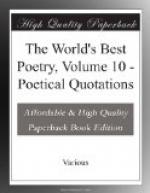But how would it have been possible for Milton to have enriched his poetry with all these elements in a primaeval age, when many of them did not exist? Indeed, Milton’s own words show how he regarded the task of writing the “Paradise Lost,” to which he had consecrated his energies, In a pamphlet issued in 1641 he wrote:
“Neither do I think it shame to covenant with any knowing reader, that for some few years yet I may go on trust with him toward the payment of what I am now indebted, as being a work not to be raised from the heat of youth or the vapors of wine, like that which flows at waste from the pen of some vulgar amorist, or the trencher-fury of a riming parasite, nor to be obtained by the invocation of Dame Memory and her Siren daughters, but by devout prayer to that eternal Spirit who can enrich with all utterance and knowledge, and sends out his Seraphim with the hallowed fire of his altar to touch and purify the lips of whom he pleases. To this must be added industriously select reading, steady observation, insight into all seemly and generous arts and affairs—till which in some measure be compassed at mine own peril and cost, I refuse not to sustain this expectation from as many as are not loth to hazard so much credulity upon the best pledges that I can give them.”
The poem was published in 1667, so that for at least twenty-six years the poet was utilizing all the available resources of civilization and scholarship to make himself “more fit.”
But we may cite against Macaulay’s theory also a brief passage in the essay on Burns by Thomas Carlyle—surely a prose-poet, if ever there was one. Treating of the achievement of Burns in spite of his crude surroundings, ignorance, and lack of most that distinguishes civilization from that childlike simplicity of primaeval life which Macaulay regards as the more favorable to developing poetical temperament, Carlyle says of the ploughman-poet:
“Let it not be objected that he did little. He did much, if we consider where and how. If the work performed was small, we must remember that he had his very materials to discover; for the metal he worked in lay hid under the desert moor, where no eye but his had guessed its existence; and we may almost say, that with his own hand he had to construct the tools for fashioning it. For he found himself in deepest obscurity, without help, without instructions, without model; or with models only of the meanest sort. An educated man stands, as it were, in the midst of a boundless arsenal and magazine, filled with all the weapons and engines which man’s skill has been able to devise from the earliest time; and he works, accordingly, with a strength borrowed from all past ages. How different is his state who stands on the outside of that storehouse, and feels that its gates must be stormed, or remain forever shut against him! His means are the commonest and rudest; the mere work done is no measure of his strength. A dwarf behind his steam-engine may remove mountains; but no dwarf will hew them down with a pickaxe; and he must be a Titan that hurls them abroad with his arms.




